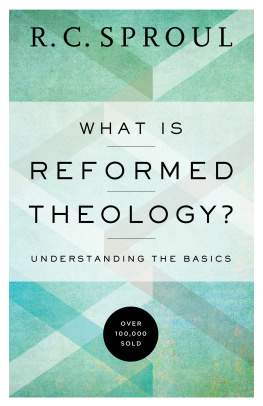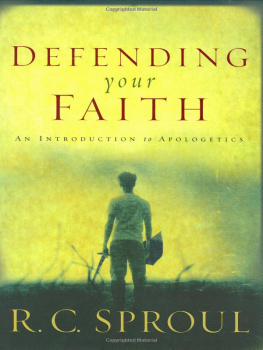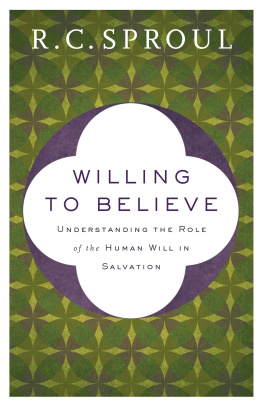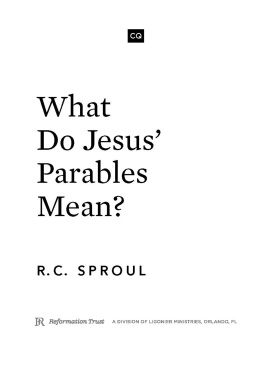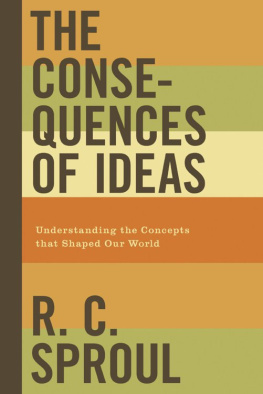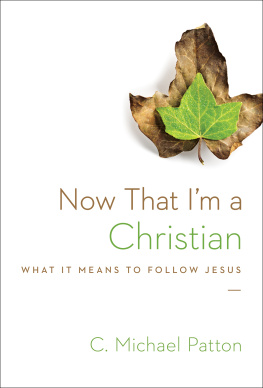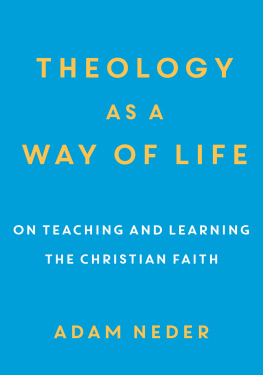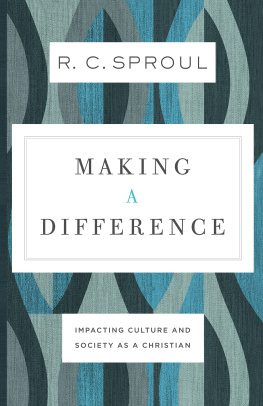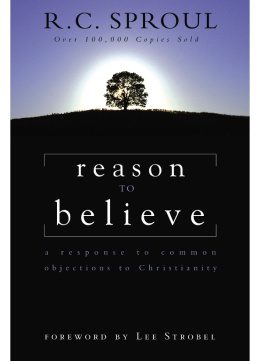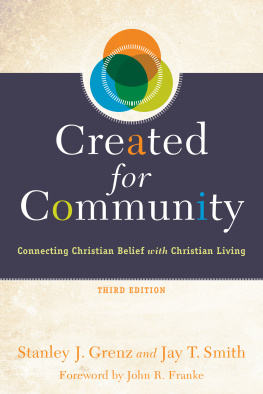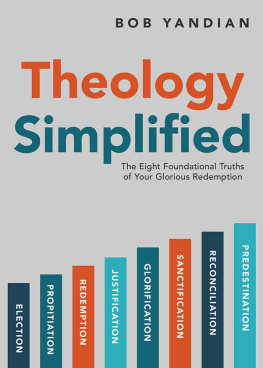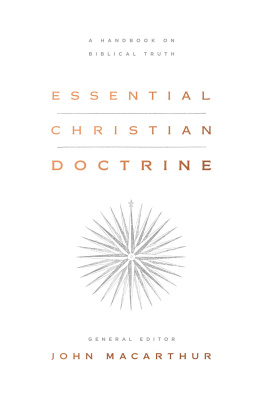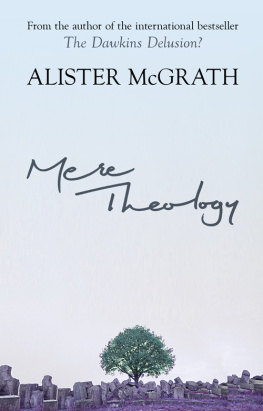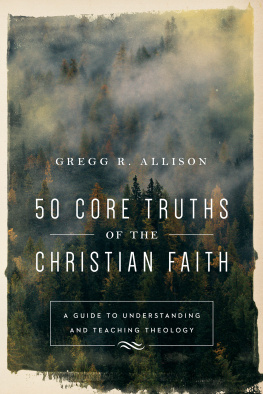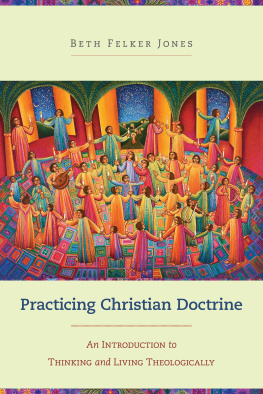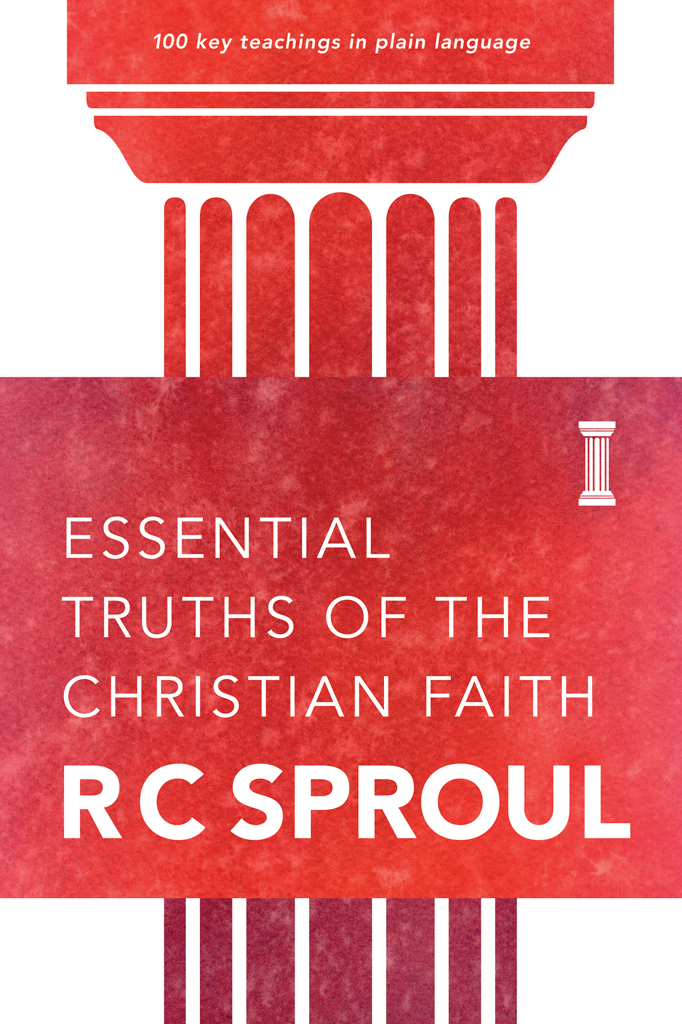Visit Tyndales exciting Web site at www.tyndale.com.
Copyright 1992 by R. C. Sproul. All rights reserved.
Cover background texture copyright by Wetzel & Company. All rights reserved.
All Scripture quotations, unless otherwise indicated, are taken from the New King James Version. Copyright 1982 by Thomas Nelson, Inc. Used by permission. All rights reserved.
PREFACE
Orlando
July, 1992
Every Christian is a theologian. We are always engaged in the activity of learning about the things of God. We are not all theologians in the professional or academic sense, but theologians we are, for better or for worse. The for worse is no small matter. Second Peter warns that heresies are destructive to the people of God and are blasphemies committed against God. They are destructive because theology touches every dimension of our lives.
The Bible declares that as a man thinks in his heart, so is he. This declaration sounds strange. It is almost as if the biblical writer blunders. He seems to confuse the mind and the heart. We normally associate thought with the brain and feelings with the heart. So what does it mean to say a man thinks in his heart? The phrase to think in the heart refers to thoughtful reflection. Many ideas are briefly entertained by the mind without ever penetrating the heart. Those ideas that do grasp us in our innermost parts, however, are the ideas that shape our lives. We are what we think. When our thoughts are corrupted, our lives follow suit.
We all know that people can recite the creeds flawlessly and make As in theology courses while living godless lives. We can affirm a sound theology and live an unsound life. Sound theology is not enough to live a godly life. But it is still a requisite for godly living. How can we do the truth without first understanding what the truth is?
No Christian can avoid theology. Every Christian has a theology. The issue, then, is not, do we want to have a theology? Thats a given. The real issue is, do we have a sound theology? Do we embrace true or false doctrine?
This is not a textbook of formal theology. It is a laypersons introduction to the essential doctrines of Christianity. To understand the Bibles message, we must first understand the concepts by which the message is set forth. Hence, the purpose of this book is to introduce the reader to the key concepts that together make up the biblical message.
Each concept is set forth in brief, bite-size portions. Suggested biblical references are added to flesh out the skeletal treatment of each concept. The book is both basic and elementary. It is designed to be simple, though not simplistic. I have tried to crystallize into a few pages the essence of theological concepts that are each worthy of a full volume to plumb their depths.
Those who read and study this book will not become experts in theology. But they will become familiar with the key concepts that are the framework for a full-orbed theology. It is my hope that those who read this book will be provoked into a deeper study of theology, which is a lifelong enterprise.
My thanks to Wendell Hawley of Tyndale House for suggesting this work, to Donna Mack for preparing the manuscript, to David Freeland for helping with the graphics, and to my son, R.C., for his editorial skill.
INTRODUCTION
In the decade of the 1980s, a massive and comprehensive study of religion in American life was undertaken by the Gallup organization. Though the sharpest trends and indicators of the study were published and evaluated in various magazines, the mountain of data collected was generally not made public. George Gallup then submitted the data to Christianity Today, who, in turn, selected a few theologians to examine and evaluate the significance of the information. I was among the group who had the privilege of analyzing the complete data.
The results of the study were as terrifying as they were revealing. Among the more noteworthy elements were the following: (1) more than sixty million Americans claim to have had a personal conversion experience, and (2) an extraordinarily high percentage of Americans said they believed the Bible to be the Word of God.
Counterbalancing these affirmations, however, was the clear revelation that Americans, even evangelical Americans, are woefully ignorant of the content of Scripture and even more ignorant of the history of Christianity and classical Christian theology. Perhaps most alarming was the realization that the mass of people who claim to have biblical faith have had little or no impact on the structures and values of American culture. For example, some recent studies concerning sexual ethics and the question of abortion suggest that the difference in behavior between evangelical Christians and secularists is negligible. In other words, the clear message of these studies is this: Christian faith is making little or no difference in peoples lives and in American culture. How accurate these studies are is a matter of debate.
How can this be? One possibility quickly comes to mind. Perhaps many of those who claim to have had a conversion experience are mistaken or lying about their conversion. However, if only half of those who claim to be born again are in fact regenerate, we must conclude that America has experienced a revival more widespread than the Great Awakening.
If such a revival has happened, then we must ask why there is so little evidence of its impact on culture. We seem to have had a huge revival with little or no reformation. Indeed, the discrepancy between revival and reformation would be the greatest ever to occur in the history of Christianity. Such a revival is mere fiction. It is spurious. It is not true biblical faith that has been revived.
A more optimistic view of this anomaly would be this: The chief reason we observe so little evidence of the revivals impact on life and culture is because it is too early to discern it. The millions of people who have been born again are still in their spiritual infancy. When they arrive at spiritual maturity, their impact on the nation will surely be felt.
In the secular culture, teenagers tend to have a powerful impact on the shape of values, but not as great an impact as those adults who are in positions of power and influence. Infants, however, have virtually no impact on the shaping of cultural values.
Their voice is not heard save in their cries for more milk. Infants have not developed their thinking and skills to a level whereby their counsel is sought in the family or the community. They must mature, they must come of age before they are put in positions of family or community leadership.
We hope that those who remain in spiritual infancy will indeed grow to maturity and have a strong impact on the family, the community, the nation, and the world. So far that has not happened. It may never happen. But for a true spiritual revival and reformation to take place, several barriers must be overcome. It is crucial for the Christian to understand these.


